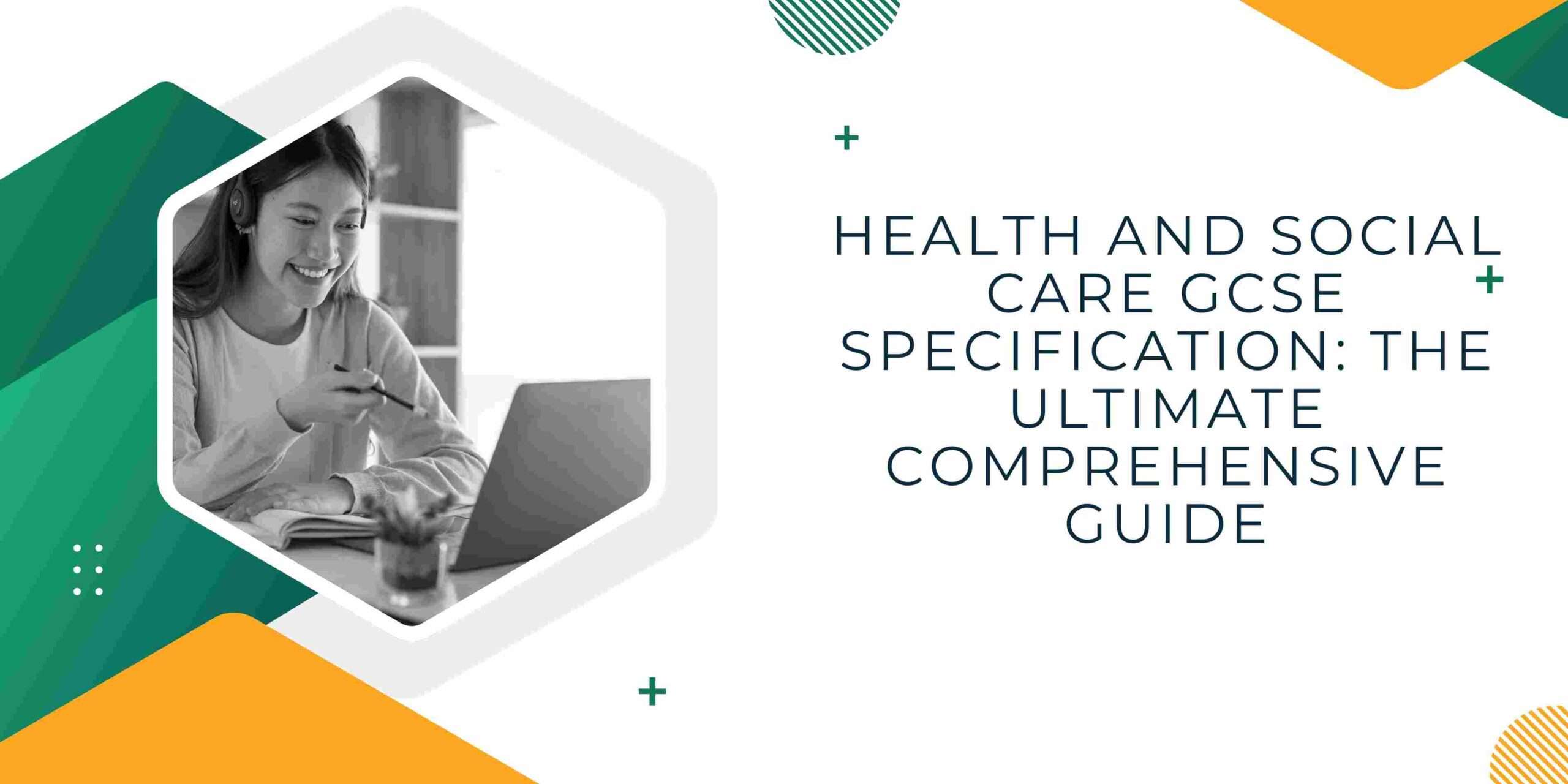Introduction
The field of health and social care plays a critical role in maintaining the wellbeing of individuals and communities. At the GCSE level, studying health and social care introduces students to essential knowledge, skills, and values required for a career in healthcare, social services, or community work.
Understanding the health and social care GCSE specification is vital for students, teachers, and parents who wish to grasp the scope, expectations, and structure of the qualification.
This guide provides exploration of the health and social care GCSE specification, covering its components, learning outcomes, assessment methods, and career implications.
What Is Health and Social Care GCSE?
The Health and Social Care GCSE is a secondary-level qualification offered to students aged 14–16 in the UK.
It focuses on understanding human development, the importance of health promotion, communication skills, values in care, and the roles of health and social care practitioners.
Students are introduced to real-world scenarios, case studies, and critical thinking exercises that prepare them for further education and careers in the health and social care sector. Read more…
Why Choose Health and Social Care GCSE?
1. Foundation for Future Careers
This course lays the groundwork for careers in nursing, social work, midwifery, counselling, healthcare management, and more.
2. Real-World Applications
Students apply theoretical knowledge to real-life contexts, enhancing problem-solving, empathy, and communication skills.
3. Interdisciplinary Learning
The course integrates aspects of biology, psychology, sociology, ethics, and public health.
4. Pathway to Advanced Qualifications
Success in Health and Social Care GCSE enables progression to A-Levels, BTECs, and university degrees in health-related fields.
Health and Social Care GCSE Specification: Full Breakdown
1. Course Overview
The health and social care GCSE specification is structured to ensure students develop:
- Knowledge of human development through life stages
- Understanding of health needs and wellbeing
- Skills in communication, care values, and person-centered approaches
- Insight into working practices of health and social care professionals
Specifications vary slightly depending on the exam board (e.g., Pearson Edexcel, OCR, WJEC), but core elements remain consistent.
2. Key Themes and Topics
A. Human Growth and Development
- Physical, intellectual, emotional, and social development across life stages (birth to death)
- Factors affecting growth and development, including genetics, environment, lifestyle, and life events
- How individuals respond to changes such as puberty, marriage, parenthood, retirement, and bereavement
B. Health and Wellbeing
- Definitions and models of health and wellbeing
- Factors influencing health (e.g., genetic, environmental, social, lifestyle)
- Health promotion methods and campaigns
- Early intervention strategies and healthcare support systems
C. Care Values
- Principles of dignity, respect, confidentiality, and safeguarding
- Anti-discriminatory practices
- Empowering individuals and promoting independence
- Building positive relationships in care settings
D. Communication in Health and Social Care
- Verbal, non-verbal, and written communication
- Active listening skills
- Barriers to communication and ways to overcome them
- The impact of communication on service users and care delivery
E. Working in Health and Social Care
- Roles and responsibilities of health and social care professionals (e.g., doctors, nurses, social workers, support workers)
- Multidisciplinary teamwork
- Codes of practice and regulatory bodies
- The importance of continuing professional development (CPD)
3. Assessment Structure
The health and social care GCSE specification assessment typically includes:
1. Examination (External Assessment)
- Written exam paper(s)
- Covers knowledge, case studies, and scenario-based questions
- Tests understanding of theoretical concepts and their practical application
2. Controlled Assessment (Internal Coursework)
- Research-based projects
- Analysis of case studies
- Practical demonstrations (e.g., role plays)
- Reflection on care values and communication techniques
Marks are usually weighted between exams (around 40%-60%) and coursework (40%-60%), depending on the exam board.
4. Skills Developed Through the Course
- Critical Thinking: Evaluate case studies, assess care plans, and propose solutions.
- Empathy and Compassion: Understand client needs and experiences.
- Communication: Deliver and receive information effectively.
- Problem-Solving: Address barriers to care and communication.
- Ethical Awareness: Navigate moral dilemmas in healthcare scenarios.
5. Exam Boards Offering Health and Social Care GCSE
A. Pearson Edexcel
- Combines theory and practical application.
- Focus on human lifespan development and health promotion.
B. OCR (Oxford Cambridge and RSA)
- Emphasis on communication, service values, and working in health and social care.
C. WJEC Eduqas
- Strong focus on community care and health promotion projects.
Each exam board provides detailed specifications, past papers, and support materials.
Detailed Modules and Learning Outcomes
Module 1: Human Lifespan Development
Learning Objectives:
- Understand the stages of human development.
- Identify the factors that influence growth and change.
- Analyze the impact of significant life events on individuals.
Key Topics:
- Infancy, childhood, adolescence, adulthood, and later adulthood
- Physical and intellectual development milestones
- Social and emotional needs at different stages
Module 2: Health and Wellbeing
Learning Objectives:
- Define health and factors affecting wellbeing.
- Assess health status using indicators like BMI, blood pressure, and lifestyle choices.
- Develop and evaluate health improvement plans.
Key Topics:
- Health indicators
- Public health campaigns (e.g., smoking cessation, obesity prevention)
- Risk assessments and intervention strategies
Module 3: Effective Communication
Learning Objectives:
- Demonstrate effective communication in various contexts.
- Identify communication needs based on individual service users.
- Overcome barriers to communication.
Key Topics:
- Forms of communication
- Adapting communication for specific needs (e.g., disabilities, language barriers)
- Recording and reporting information appropriately
Module 4: Principles of Care
Learning Objectives:
- Uphold care values in practice.
- Respect the rights and dignity of individuals.
- Promote equality, diversity, and inclusion.
Key Topics:
- Safeguarding vulnerable individuals
- Promoting independence and empowerment
- Conflict resolution in care settings
Career Opportunities After Health and Social Care GCSE
Students completing the health and social care GCSE specification often continue their education or move directly into related careers.
A. Further Education Options
- A-Level Health and Social Care
- Level 3 BTEC National in Health and Social Care
- Access courses for Nursing or Midwifery
B. Career Paths
- Healthcare Assistant
- Social Work Assistant
- Youth Worker
- Early Years Practitioner
- Care Worker in Residential Homes
With further study, options expand to:
- Registered Nurse
- Social Worker
- Paramedic
- Midwife
- Occupational Therapist
How to Excel in Health and Social Care GCSE
- Understand the Specification Thoroughly:
Study the official specification document for your exam board. - Apply Knowledge Practically:
Link theories to real-world case studies. - Practice Past Papers:
Familiarize yourself with question styles and exam techniques. - Use Mnemonics and Mind Maps:
Help memorize complex information efficiently. - Stay Updated:
Follow current health news, public health campaigns, and NHS initiatives.
Frequently Asked Questions (FAQs)
Q1: What skills are most important for success in health and social care GCSE?
A1: Communication, empathy, critical thinking, ethical judgment, and problem-solving.
Q2: Can you study health and social care GCSE online?
A2: Yes, many distance learning providers and schools offer online study options.
Q3: Is there a lot of coursework in health and social care GCSE?
A3: Yes, coursework forms a significant portion, allowing students to demonstrate practical understanding.
Q4: Does this GCSE help with applying to nursing courses?
A4: Absolutely! It builds a strong foundation for nursing, midwifery, and other health professions.
Conclusion
The health and social care GCSE specification offers students an invaluable opportunity to explore critical aspects of human development, wellbeing, and professional care.
Through a combination of theoretical knowledge and practical application, students gain essential skills that are applicable not only in academic settings but also in everyday life and future careers.
By carefully selecting an exam board, mastering the course content, and applying yourself diligently, you can leverage the health and social care GCSE as a stepping stone toward a rewarding and impactful profession in health, care, and social services.
Read More:







